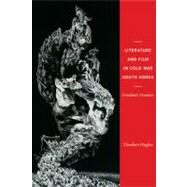Literature and Film in Cold War South Korea
, by Hughes, Theodore- ISBN: 9780231157483 | 0231157487
- Cover: Hardcover
- Copyright: 3/27/2012
Theodore Hughes reads South Korean literary and film production during a time of great artistic and technological innovation. Taking advantage of new modes and media in the early twentieth century, South Korean writers and filmmakers crossed literary and visual cultures in richly evocative ways. Working under the stress of Japanese occupation (1910--1945) and the tension of the Cold War, these artists sought subtle strategies for representing the realities of colonialism and national division. Their efforts shaped not only the trajectory of art and culture in the Korean peninsula but also the society and politics of Asia as a whole. Hughes begins with the literature and film of South Korea's colonial period and follows with their influence on the emerging proletarian movement, literary modernism, nativism, and wartime mobilization. These developments then informed the efforts of Cold War writers and filmmakers as they confronted the aftershocks of colonialism and separate North and South Korean identities. The division of the Korean Peninsula, Hughes argues, must be understood through the politics of the visual, and he identifies ways of seeing and their organization of a postcolonial culture of division and authoritarianism. He also describes later efforts by South Korean filmmakers and intellectuals to dismantle the post-1945 order. Hughes ultimately situates the making of South Korea's Cold War culture within the framework of Asian and American Cold War scholarship. At the same time, he puts neglected Korean texts, art, and film into conversation with studies on Japanese imperialism and Korea's colonial history.







